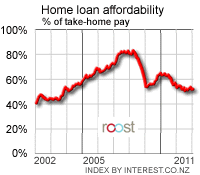 New Zealand home loan affordability deteriorated in December to its worst level since November 2008 after a rise in both house prices and mortgage rates, Interest.co.nz's home loan affordability report shows. Affordability worsened most in Wellington, Nelson/Marlborough and Canterbury as median house prices rose to record highs despite low turnover. Auckland is fast catching Queenstown again as the least affordable region in New Zealand as prices rose in the harbour city while prices fell in the alpine resort. Affordability is at its worst levels nationally since November last year and has degraded faster in late 2009 than at any time since the peak of the housing boom in early 2007, the monthly measure calculated by Interest.co.nz found. "The latest deterioration in housing affordability adds to the debate about tax reform sparked by the report from the Tax Working Group, which suggests property tax reforms that could reduce prices," said Interest.co.nz Editor Bernard Hickey.
New Zealand home loan affordability deteriorated in December to its worst level since November 2008 after a rise in both house prices and mortgage rates, Interest.co.nz's home loan affordability report shows. Affordability worsened most in Wellington, Nelson/Marlborough and Canterbury as median house prices rose to record highs despite low turnover. Auckland is fast catching Queenstown again as the least affordable region in New Zealand as prices rose in the harbour city while prices fell in the alpine resort. Affordability is at its worst levels nationally since November last year and has degraded faster in late 2009 than at any time since the peak of the housing boom in early 2007, the monthly measure calculated by Interest.co.nz found. "The latest deterioration in housing affordability adds to the debate about tax reform sparked by the report from the Tax Working Group, which suggests property tax reforms that could reduce prices," said Interest.co.nz Editor Bernard Hickey.
"Housing affordability is getting worse rather than better despite near record low interest rates. It is basically unaffordable now for anyone on one median income to buy their own home in most of the major cities," Hickey said. 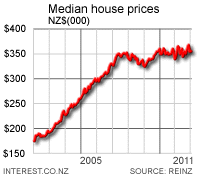 The Home Loan Affordability measure for all of New Zealand showed the proportion of a single median after tax income needed to service an 80% mortgage on a median house rose by 0.9 percentage points to 62.7%. The median house price as measured by REINZ rose in December to a record NZ$360,000 from NZ$355,000 in November and has now risen 11% from its January 2009 trough of NZ$325,000. The average 2 year fixed mortgage rate, which has been among the most popular with borrowers in recent years, rose 7 basis points to 7.20% over the month and has now risen from an average 5.92% in February last year. Variable mortgage rates, meanwhile, were flat in the last month at an average 6.00% and are now at their lowest level in at least 7 years, meaning some borrowers may choose to go variable rather than fixed to improve their immediate affordability.
The Home Loan Affordability measure for all of New Zealand showed the proportion of a single median after tax income needed to service an 80% mortgage on a median house rose by 0.9 percentage points to 62.7%. The median house price as measured by REINZ rose in December to a record NZ$360,000 from NZ$355,000 in November and has now risen 11% from its January 2009 trough of NZ$325,000. The average 2 year fixed mortgage rate, which has been among the most popular with borrowers in recent years, rose 7 basis points to 7.20% over the month and has now risen from an average 5.92% in February last year. Variable mortgage rates, meanwhile, were flat in the last month at an average 6.00% and are now at their lowest level in at least 7 years, meaning some borrowers may choose to go variable rather than fixed to improve their immediate affordability. 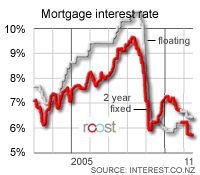 Meanwhile, median incomes rose 0.7% in the last month, albeit under pressure from a flat employment market, less overtime and lower bonuses. "The underlying indications of a faltering housing market suggest the talk of property tax reform and the problems with affordability are causing buyers and bankers to think twice," Interest.co.nz Editor Bernard Hickey said. "The outlook for higher interest rates later year may take some of the heat out of the worsening affordability situation, but only a fall in house prices will drive a significant turnaround," Hickey said. Affordability hit its worst level of 83.4% in March 2008 just after house prices peaked and 2 year mortgage rates were close to 10%. Many home buyers jumped in March, April and May of this year to take advantage of lower interest rates and look for bargains, which improved the number of houses sold and boosted prices. But short term mortgage interest rates flattened out in late March and longer term mortgage rates began to rise in line with rises on wholesale markets and higher local term deposit rates.
Meanwhile, median incomes rose 0.7% in the last month, albeit under pressure from a flat employment market, less overtime and lower bonuses. "The underlying indications of a faltering housing market suggest the talk of property tax reform and the problems with affordability are causing buyers and bankers to think twice," Interest.co.nz Editor Bernard Hickey said. "The outlook for higher interest rates later year may take some of the heat out of the worsening affordability situation, but only a fall in house prices will drive a significant turnaround," Hickey said. Affordability hit its worst level of 83.4% in March 2008 just after house prices peaked and 2 year mortgage rates were close to 10%. Many home buyers jumped in March, April and May of this year to take advantage of lower interest rates and look for bargains, which improved the number of houses sold and boosted prices. But short term mortgage interest rates flattened out in late March and longer term mortgage rates began to rise in line with rises on wholesale markets and higher local term deposit rates. 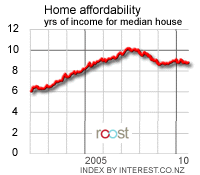 House sales volumes have flattened off in the last three months as first home buyers and rental investors stayed away, leaving most of the activity at the top end for owner-occupiers using equity stored up during the 2002-07 boom or trading down to reduce debt. Affordability is now often out of reach for most home buyers on a single income. The threshold proportion of after tax income considered prudent to sustainably own a house is around 40%. Anything above that is starting to become unaffordable. Affordability for the typical first-home-buyer was stable in December. The proportion of a single after tax pay needed to buy a first quartile house was flat at 54.0%. This is also the highest level since November 2008. The first quartile house price was unchanged in December at NZ$255,000. This measure is for a median income earner aged 25-29 buying a first quartile home. Interest.co.nz thinks the "˜affordable' threshold is 40% for such a home buyer.
House sales volumes have flattened off in the last three months as first home buyers and rental investors stayed away, leaving most of the activity at the top end for owner-occupiers using equity stored up during the 2002-07 boom or trading down to reduce debt. Affordability is now often out of reach for most home buyers on a single income. The threshold proportion of after tax income considered prudent to sustainably own a house is around 40%. Anything above that is starting to become unaffordable. Affordability for the typical first-home-buyer was stable in December. The proportion of a single after tax pay needed to buy a first quartile house was flat at 54.0%. This is also the highest level since November 2008. The first quartile house price was unchanged in December at NZ$255,000. This measure is for a median income earner aged 25-29 buying a first quartile home. Interest.co.nz thinks the "˜affordable' threshold is 40% for such a home buyer. 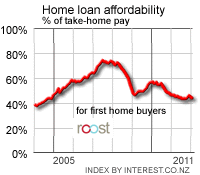 Meanwhile, affordability for households with more than one income worsened to levels last seen at the end of 2008. This measure of a "˜standard typical household' found the proportion of after tax income needed to service the mortgage on a median house rose to 41.2% in December from 40.6% in November. This measure assumes one median male income, half a median female income aged 30-35 and a 5 year old child that receives Working for Families. This remains at the worst level of standard household affordability since November last year and significantly above the 35% trough seen in January, February and March when buyer demand returned to the housing market. Any level over 40% is considered unaffordable for a household.
Meanwhile, affordability for households with more than one income worsened to levels last seen at the end of 2008. This measure of a "˜standard typical household' found the proportion of after tax income needed to service the mortgage on a median house rose to 41.2% in December from 40.6% in November. This measure assumes one median male income, half a median female income aged 30-35 and a 5 year old child that receives Working for Families. This remains at the worst level of standard household affordability since November last year and significantly above the 35% trough seen in January, February and March when buyer demand returned to the housing market. Any level over 40% is considered unaffordable for a household. 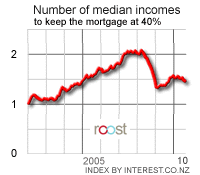 Our measure of a "˜standard first-home-buyer household' found the proportion of after tax income needed to service the mortgage on a first quartile home rose was 25.6% in December, unchanged from November. It has worsened from its best levels of 22% in February and March when some first-home-buyers returned to the market. This measure peaked at 35% in June 2007. This measure assumes a first home buyer household includes a median male income and a median female income aged 25-29 with no children. Any level over 30% is considered unaffordable in the longer term for such a household. Southland remains the most affordable region for home buyers with a standard affordability measure of 34.9%, while the Central Otago Lakes (Wanaka and Queenstown) is the least affordable on 81.3%, although it is being quickly caught by Auckland on 76.9%, up from 76.8% the previous month. Central Otago affordability has improved from a peak of 137.6% in July last year as apartment prices have crashed in the wake of the collapse of several finance companies. Wellington's affordability worsened to 64.5% from at 63.1% and Christchurch affordability worsened to 57.5% from 55.7% as house prices rose.
Our measure of a "˜standard first-home-buyer household' found the proportion of after tax income needed to service the mortgage on a first quartile home rose was 25.6% in December, unchanged from November. It has worsened from its best levels of 22% in February and March when some first-home-buyers returned to the market. This measure peaked at 35% in June 2007. This measure assumes a first home buyer household includes a median male income and a median female income aged 25-29 with no children. Any level over 30% is considered unaffordable in the longer term for such a household. Southland remains the most affordable region for home buyers with a standard affordability measure of 34.9%, while the Central Otago Lakes (Wanaka and Queenstown) is the least affordable on 81.3%, although it is being quickly caught by Auckland on 76.9%, up from 76.8% the previous month. Central Otago affordability has improved from a peak of 137.6% in July last year as apartment prices have crashed in the wake of the collapse of several finance companies. Wellington's affordability worsened to 64.5% from at 63.1% and Christchurch affordability worsened to 57.5% from 55.7% as house prices rose.

We welcome your comments below. If you are not already registered, please register to comment
Remember we welcome robust, respectful and insightful debate. We don't welcome abusive or defamatory comments and will de-register those repeatedly making such comments. Our current comment policy is here.